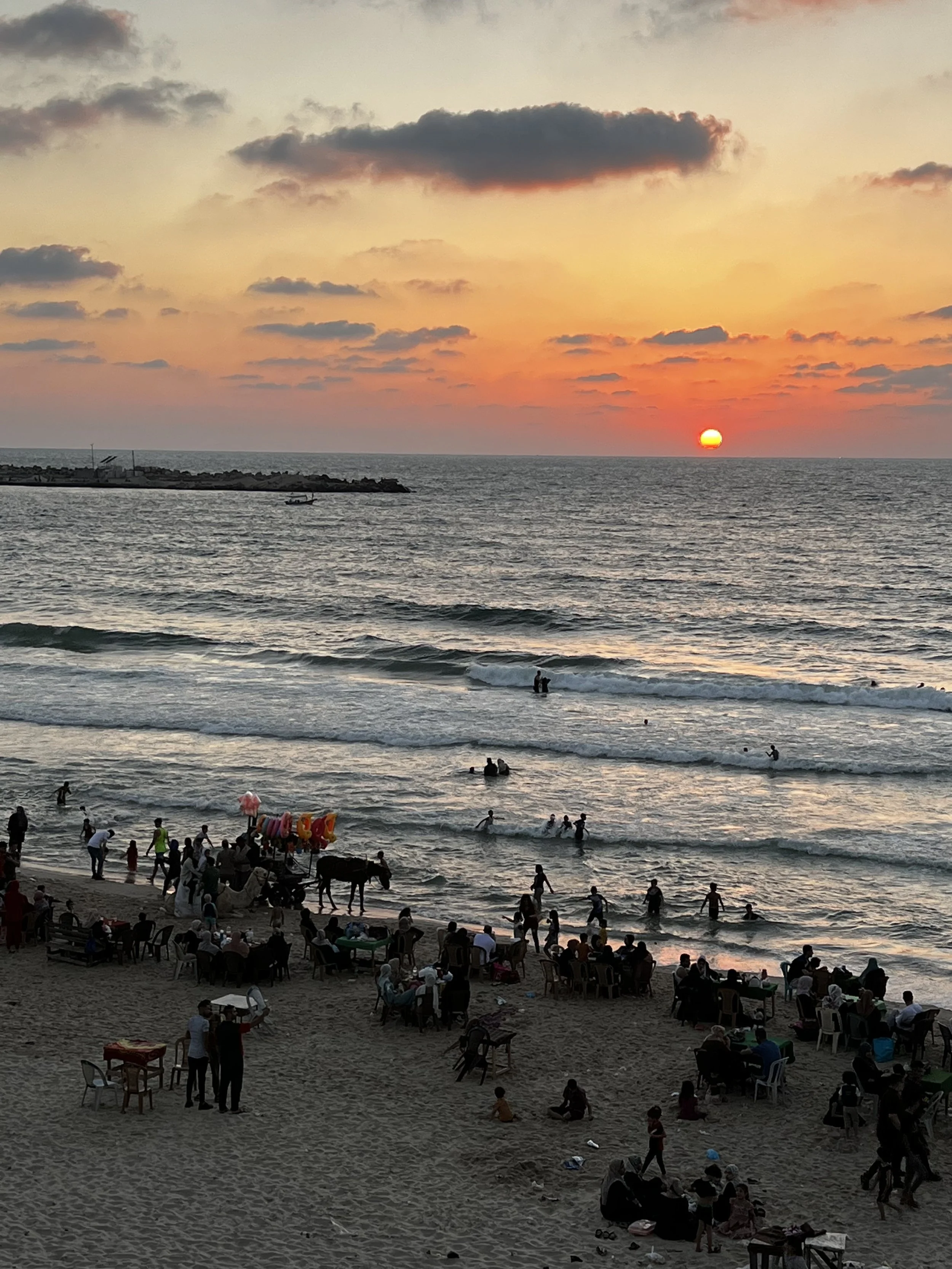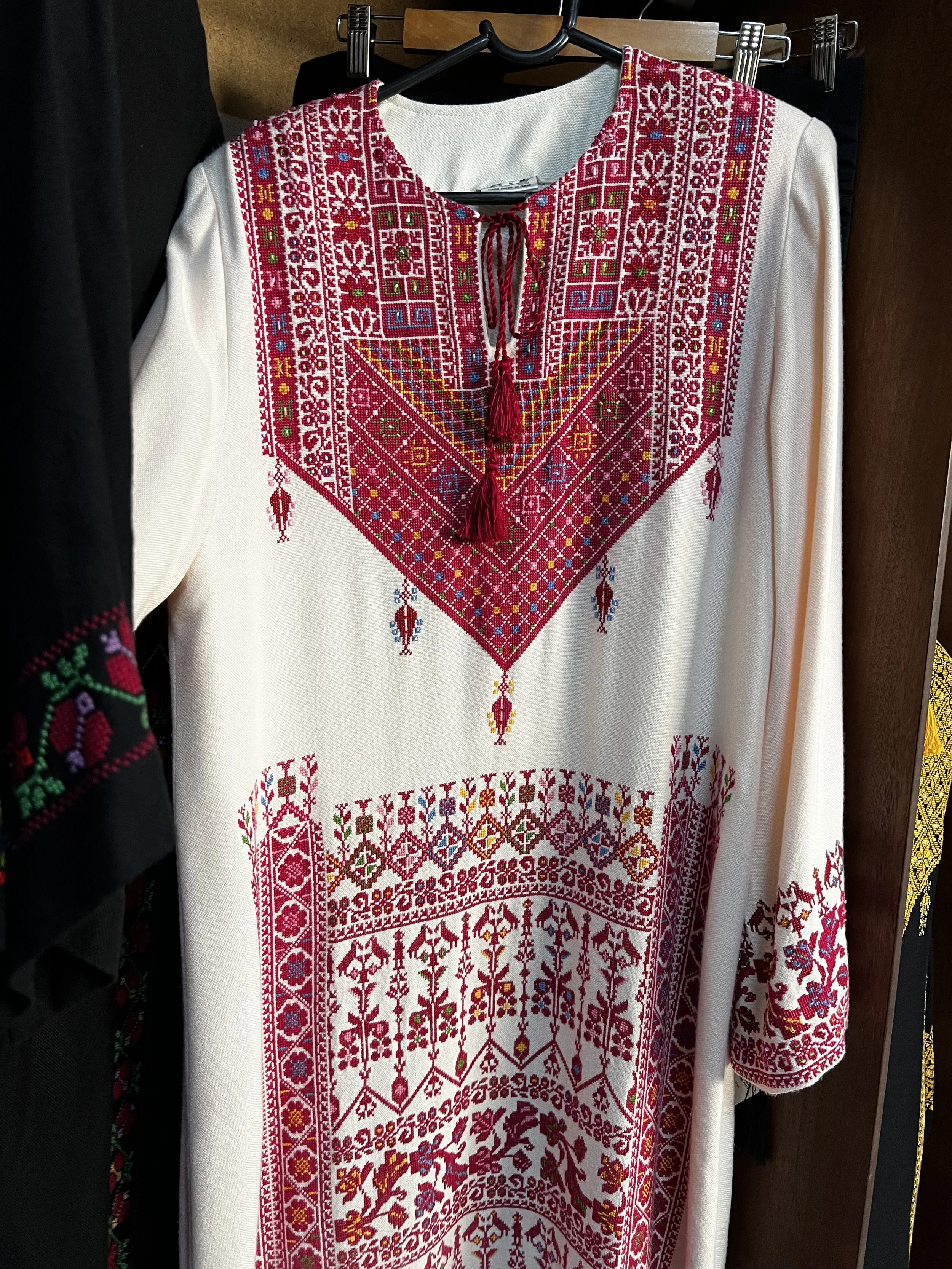Laila’s Diary: Return to Gaza
This piece is the third of our communications team’s recap series to highlight our trip to Palestine in the summer of 2022.
As a fourth-generation Arab American, I’ve never lived in my family’s countries of origin. I only had the chance to visit once in the summer of 1998 when my parents took the family on a month-long road trip through Lebanon, Syria, Jordan, and Palestine. Closed borders make that drive impossible today. In my nine years with UNRWA USA, I’ve had the opportunity to visit refugee camps almost annually, including in Gaza. Severe movement restrictions imposed by Israel and Egypt prevent almost everyone from traveling to or from the Gaza Strip, even for cancer patients seeking treatment. This means those of us outsiders who do get to see Gaza have a responsibility to report back on the realities and lift up the voices and experiences of those trapped there.
Once you visit the occupied Palestinian territory, you never stop talking about it.
Sunset over the Mediterranean Sea in Gaza City, occupied Palestinian territory, June 2022. Photo credit: Laila Mokhiber, UNRWA USA
When asked how the situation in Gaza is, I find myself stumbling over my words trying to describe it in a way that inspires empathy and a sense of shared humanity. On the one hand, Gaza is a manmade humanitarian catastrophe caused by blockade and bombardment. On the other hand, it’s one of the most remarkable and misunderstood places on Earth.
The vast majority of Gaza residents are refugees who fled to the Strip after 1948 from historic Palestine, which is now Israel. In Gaza, UNRWA is the main provider of basic services (schools, health clinics, mental health, social services, shelter, and emergency assistance) to over one million refugees.
Our field visits are how we follow up on the projects YOU fund, to witness the challenges Palestine refugees face. These visits help our UNRWA USA staff understand how we can better support the UN Agency and its life-saving, life-changing operations on the ground. You may have followed along on Instagram while we were there this past summer.
Gaza is as unsettling as it is charming. Witnessing my colleagues Diala and Harley see Gaza for the first time prompted mixed emotions. There is so much senseless tragedy and injustice that pains Palestinians, yet the people we met exuded an infectious love and joy for life. Like all people, refugees want and deserve all that life offers. Lifting up Palestine refugee stories is not only my job, but the way I believe we can shift perceptions, help Americans understand why we should care, and inspire us to act.
With all of this in mind, allow me to take you through my recent visit to Gaza during our second day there.
UNRWA USA Director of Communications, Laila Mokhiber, at the UNRWA Gaza Field Office, Gaza City, June 2022
UNRWA programs serve the needs and rights of refugees from health to livelihoods to their overall wellbeing.
As this was my first time back to Gaza since the pandemic began, health was a major focus and interest for us. To help us understand the health situation of refugees, we spent time in the middle area of Gaza at the UNRWA-run Bureij Women's Health Center.
From early cancer detection to vaccinations, to the rehabilitation and recovery provided to those injured during the Great March of Return, UNRWA’s frontline medical professionals prove paramount and are an example of excellence.
The health center’s leadership is entirely female, and the head doctor walked us through their multi-pronged efforts to encourage vaccinations, including phone calls and house calls. In her words, she told us that they managed to vaccinate all of their children. According to UNRWA, vaccination coverage for registered refugee children has been close to 100% for more than a decade.
Breast cancer is the most common cancer among Palestinian women, and the number one killer among women worldwide, yet chemotherapy is not available in Gaza. Cancer patients have to get permits to Jerusalem for treatment. These permits are often delayed or denied by the Israeli-Egyptian blockade. The doctors here have implemented breast cancer awareness campaigns to spread the culture of self-examination and the importance of early detection to increase the chances for survival.
At the center, we received a surprise visit from Aya and Saly, two UNRWA mental health counselors we interviewed virtually in this episode of Let’s Talk UNRWA. As American visitors to Gaza are rare, they told us how happy they were to see us in Gaza. They insisted we come over to meet their families and try their homemade Palestinian cooking. A year wouldn't be enough time to make good on all the generous invitations we received.
UNRWA USA’s team at the UNRWA-run Bureij Women’s Health Center
preserving heritage through embroidery
From the health center, we drove up the coastal highway to Gaza City where we visited another female-led UNRWA program: the Sulafa Embroidery Centre. There we met with Neveen Musleh, the center’s director.
Sulafa has become a household name for quality embroidery in Gaza, and a must-visit on every trip for me. Sulafa is where I bought my first thobe (a traditional Palestinian dress that features handmade embroidery). They have a gorgeous catalog with all the custom designs they can make which includes motifs from various Palestinian villages. The ladies working there lovingly took my measurements should I ever fancy a second custom item (orders can be made and shipped to the States).
Sulafa not only preserves the traditions and culture of Palestinian embroidery, it creates jobs for hundreds of refugee women. Blown away by the intricate artistry and beauty of all the handmade dresses, purses, pillowcases, and other handicrafts, we chose Sulafa as the supplier for our top fundraising perk for our recent Bay Area Gaza 5K event.
an open house and music jam in Gaza
I could have spent hours, days, or even weeks interviewing each refugee I met, but we only had three days in Gaza.
Each person we met in Palestine truly deserves their own in-depth feature. Recognizing how many untold stories remain, we held an open house at our hotel and invited fixers, writers, journalists, musicians, and artists from all over Gaza to join us and explore ways to tell stories and produce content that goes deeper than our short visit. With just 24 hours' notice, we were stunned by how many people eagerly showed up to help. First, five came, then 10.
We kept adding tables to accommodate the 25-30 people who came out to meet us – many were UNRWA alumni, meaning they attended UNRWA schools or benefited from the Agency’s services somehow. Nearly every person who came spoke perfect English, and for the few who didn’t, there were multiple eager translators. Those few final evening hours deepened our perspective about Gaza, our guests’ experiences, their concerns, and their hopes for themselves and their families. Gaza is full of educated, skilled, creative, passionate, and talented people. Their will to survive and thrive is only bound by the blockade. We plan to share these stories and others in the coming year in hopes that they move you as they did us.
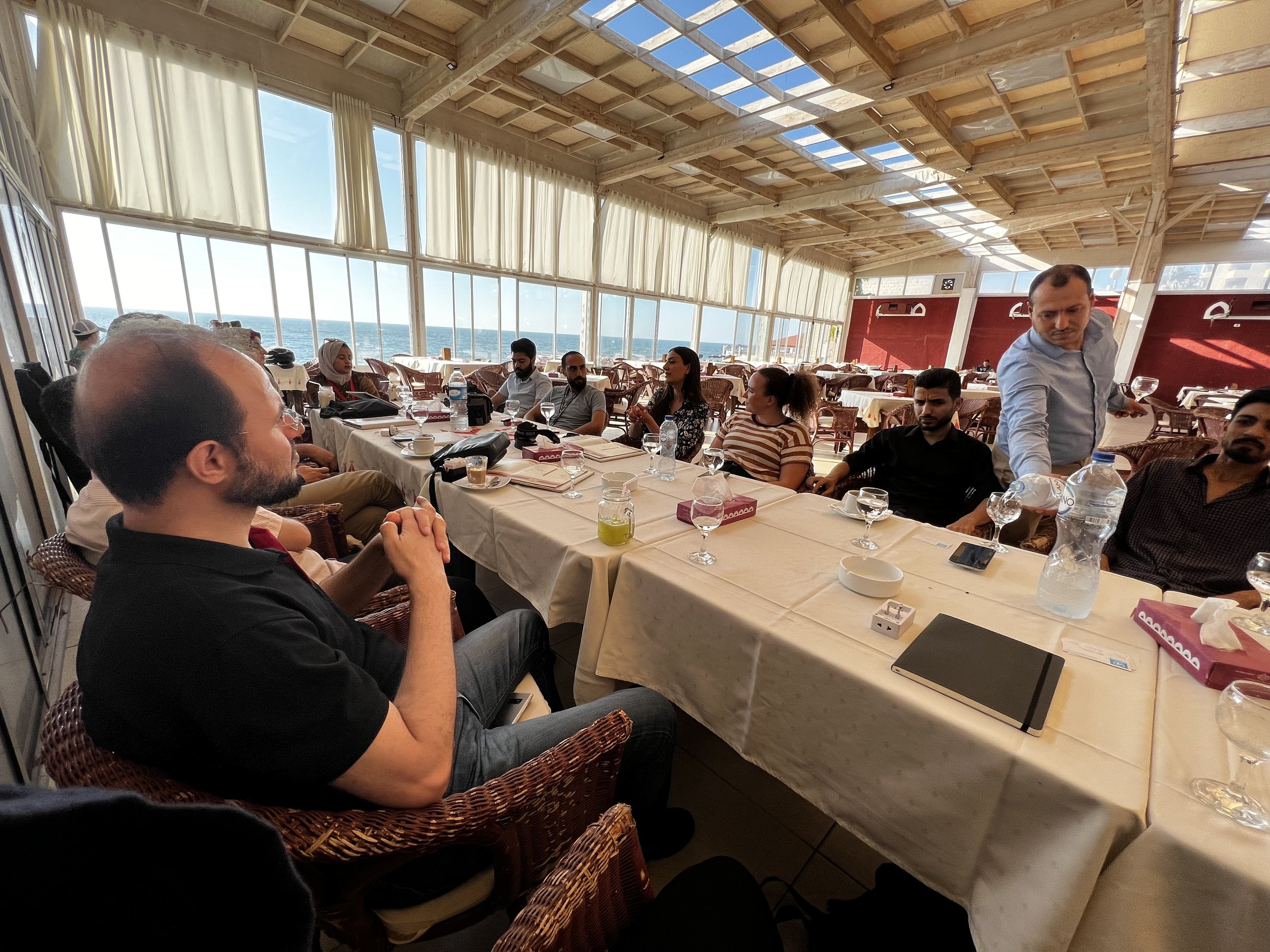
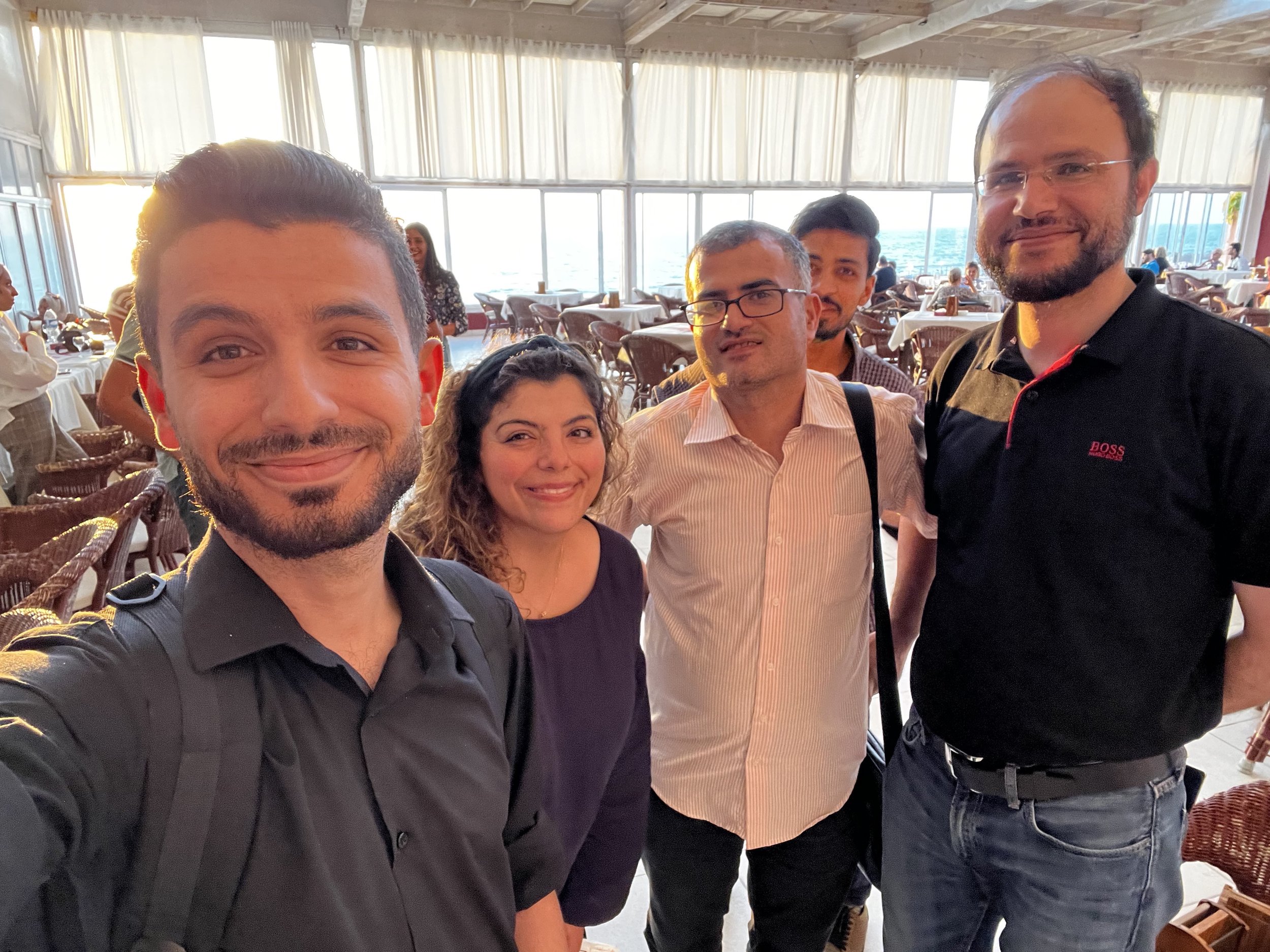
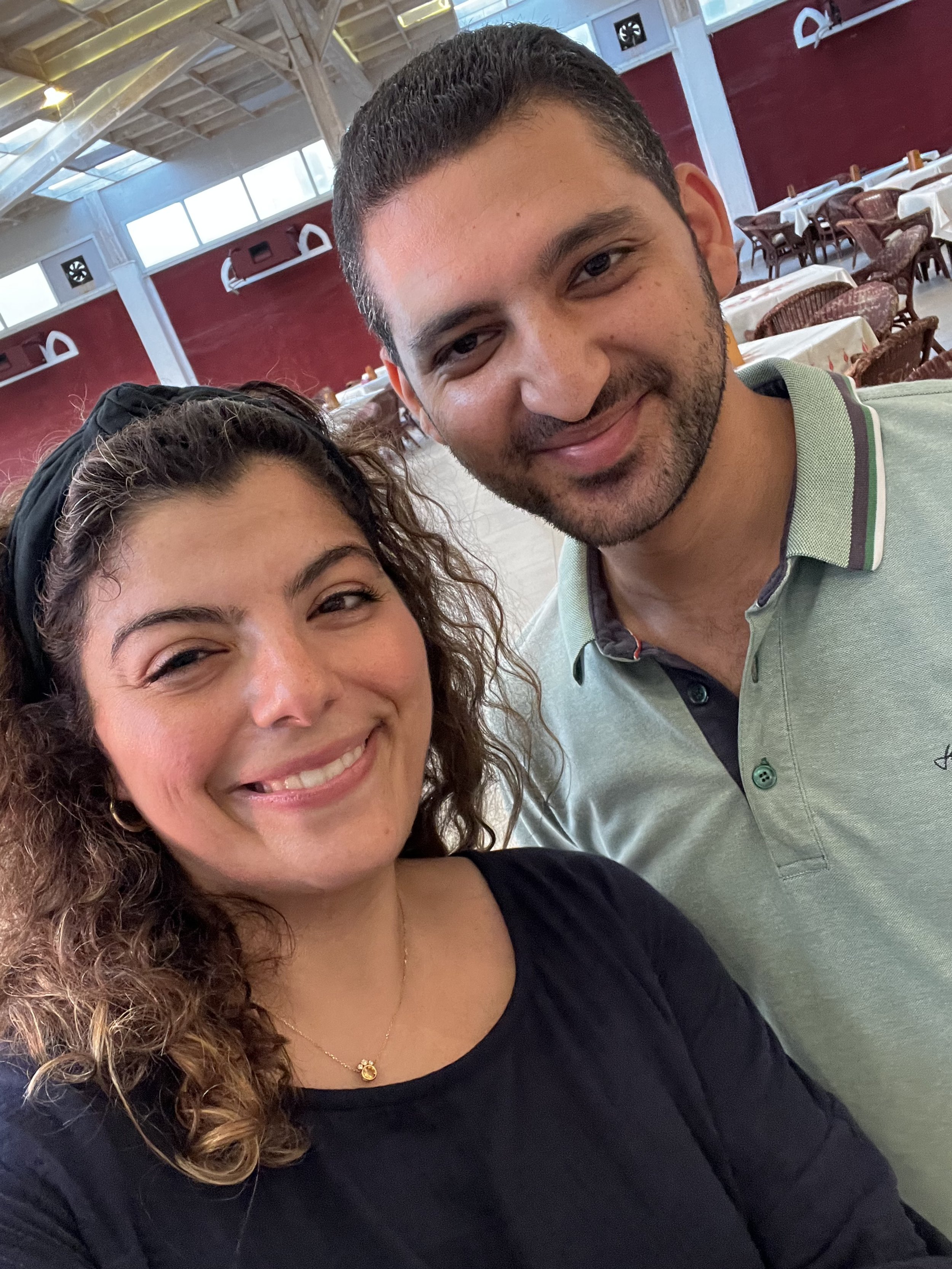
To close out the evening, we were graced with an impromptu music jam. Against the backdrop of a Mediterranean sky of pinks, yellows, and blues and a stretch of sand packed with families, we were serenaded by ultra-talented guitarists and singers from a local music studio who performed Palestinian classics and Spanish-style songs. Our hearts were filled and overflowing by the generous spirits of our new Gaza friends.
Through all the pain, through all the loss, through all the trauma and devastation, we nevertheless found joy and hope. As that sun set over the sea, I reflected that with our collective effort we will overcome dark times, and once again rise.
Impromptu music performance in Gaza by Sama Studio, June 2022
This blog article is just part of a series of reflections our communications team wrote chronicling our time this summer in the occupied Palestinian territory. Keep your eyes open for our next blog which will cover our experience with one of the UNRWA programs I hold most dear: mental health for refugees.

